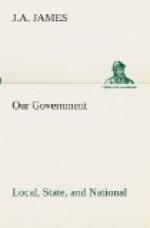The National Committee.—A National committee is also appointed, made up of one member from each State, who is nominated by the State delegation. The wishes of the Presidential candidate are of influence in the choice of the chairman, who need not be a member of the convention. The committee occupies a position of great importance, for by it the platform of the party is largely determined. We have here a body of men not mentioned by the Constitution, but exerting vastly greater influence upon the election of President than does the electoral college itself. It organizes the campaign, secures money, selects speakers, and sends out party literature. The committee looks after the interests of the party during the ensuing four years and issues the call for the next National convention.
Election of Electors.—We are now ready to consider the place of the electors in the choice of a President. The nominations of candidates for the office of elector are usually made at the State conventions of the different parties when State tickets are nominated. These occur, ordinarily, in August or September preceding the November election. Each political party nominates as many electors as the State has senators and representatives in Congress. The names of the electors are then placed on the general party ticket, on which appear also the names of the candidates for President and Vice-President; each person then votes for the entire number of electors to which his State is entitled, and will naturally vote for all the electors on his party ticket. The political party, therefore, which receives the majority of votes in a State secures all the electoral votes of that State.[40]
[Footnote 40: It has sometimes happened, however, when the election in a State has been close, that one or more of the electors on a minority ticket have run ahead of the other candidates on that ticket, and have secured a larger number of votes than candidates on the majority ticket, thus obtaining an election. California, in 1892, gave one electoral vote to Mr. Harrison and eight to Mr. Cleveland, and again, in 1896, gave eight votes to Mr. McKinley and one to Mr. Bryan. Kentucky, in 1896, cast twelve votes for Mr. McKinley and one for Mr. Bryan.]
Vacancies in the Offices of Electors.—Congress enacted in 1845 that each State might provide, by law, for the filling of vacancies in the electoral college, and that if any State failed to choose electors on the regular day, that they might be appointed on a later day in such manner as the State might, by law, direct. Nearly all of the State legislatures have conferred on the college itself the power of filling vacancies.
Function of Electors.—The steps prescribed by the Constitution must still be followed, although we know, long before the electors cast their votes, who the next President will be. The actual function of the electors is given in Amendment XII, as follows:—




